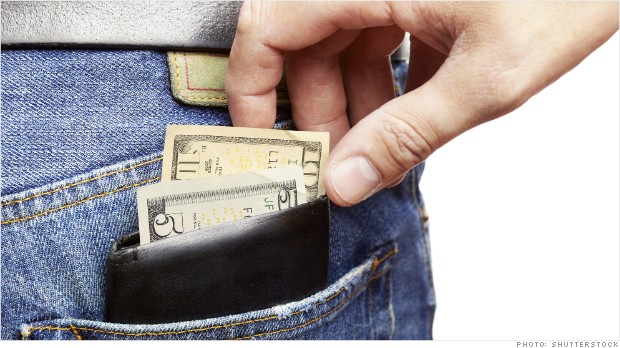
A new survey found that 8 in 10 respondents have been targets of financial scams.
NEW YORK (CNNMoney)
More than 8 in 10 consumers have received a "potentially fraudulent offer," according to a FINRA Investor Education Foundation survey of 2,000 people released Thursday.
Of those targeted, about 11% said they lost "a significant amount of money" by falling for a scam. But because people often fail to report financial fraud -- either because they don't know who to report it to or because they're too embarrassed -- this number is likely a lot higher, FINRA said.
Elderly respondents were 34% more likely to have lost money than people in their 40s, men were targeted more often than women and the likelihood of being solicited by a scammer increased with income and education level, the survey found.
And these losses can really add up -- with the most recent estimate available putting total financial fraud at a whopping $50 billion per year.
Here are the five most common scams out there:
E-mails from abroad: Most people have heard about the so-called "Nigerian scam" by now, where someone claiming to be a deposed prince from Nigeria says he has millions of dollars and wants to transfer it all to you ... he just needs your bank account information first.
There are now many versions of this scam being perpetrated, with emails often opening with a line like, 'Hello kind stranger,'" says FINRA Investor Education Foundation president Gerri Walsh.
Related: Marijuana stock scams - Don't let your money go up in smoke
"They say, 'Here's some easy money -- I'm going to transfer $10 million to your bank account and all you have to do is pay the wire transfer fees,'" said Walsh. "But really they're just taking your bank account information so they can impersonate you and wipe out your account."
'Free' lunch: Fraudsters also lure victims with invitations to free luncheons where they pitch fraudulent investments to them. They'll promise triple-digit returns or advertise investments that don't even exist, and they'll never be seen again once they get your money.
"The idea is that someone does something nice for you by inviting you to a free meal seminar and giving you information so you feel you have to give back," said Walsh.
You won the lottery!: Of course, you want to believe that you're so lucky you won a lottery that you never even bought a ticket for. But don't fall for it. This is a scheme that's been used for years, where scammers notify people that they have won a lottery -- often a lottery abroad, say in Canada or Ireland.
Related: Scamming Obamacare is harder than you think
The catch is that in order to claim your prize, you have to first pay hundreds of dollars in fees -- for customs or processing, or some other creative fee that the scammer creates.
Penny stocks: Penny stocks are notorious for being rife with fraud, Walsh says. Scammers will flock to message boards, blogs and e-mail, advertising these low-price, thinly traded securities. They find something that sounds tempting, like marijuana stocks, clean energy and gold, and tout them as the "next big thing." Once the securities are artificially pumped up by all the advertising, the scammers sell their shares and take the money, leaving the investors with nothing when the price plummets.
Cold calls: Don't befriend the stranger on the phone. Walsh says scammers often cold call their victims and know how to build friendships by not being too aggressive in their sales pitches and calling often -- pitching everything from gold coins to penny stocks to roof repair.
"It comes down to the dangling of phantom riches -- they say, 'don't you want to double your money? Don't you want to have a nice nest egg to pass on to your heirs?' And then they say if you don't buy it now it's going to go away ... that's what is supposed to get you salivating," says Walsh.
Related: Feds crack down on scams targeting timeshare owners
Protect your Achilles' heel: Fraudsters are getting increasingly creative, latching on to whatever big theme is in the news. Some other schemes people have fallen for involve fraudsters claiming to have access to private pre-IPO shares of big companies about to go public. Oil and gas scams are also common -- where you think you're investing in an oil and gas company but the "company" doesn't even have oil and gas wells or equipment.
Walsh says you should always verify that the person pitching you financial investments or products is licensed, and never rush into anything.
"Fraudsters are experts at identifying the Achilles' heels of the people they're targeting," she said. "They push you from a logical state to an emotional state, and when you're pushed into an emotional state you want to act now and you don't want to give up opportunity." ![]()
First Published: September 12, 2013: 8:39 AM ET
Anda sedang membaca artikel tentang
5 most common financial scams
Dengan url
http://bolagaya.blogspot.com/2013/09/5-most-common-financial-scams.html
Anda boleh menyebar luaskannya atau mengcopy paste-nya
5 most common financial scams
namun jangan lupa untuk meletakkan link
sebagai sumbernya
0 komentar:
Posting Komentar